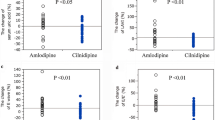Abstract
Objective: Patients with heart failure have abnormal neurohormonal regulation during orthostatic stress, and abnormal arterial baroreflex function. This study investigated the effects of alacepril, a new angiotensin-converting enzyme inhibitor with sulfhydryls, on changes in neurohormonal factors during tilt and on the arterial baroreflex control of heart rate.
Methods: Plasma concentrations of noradrenaline, adrenaline, renin activity, angiotensin II, and atrial natriuretic peptide were measured at supine rest and after 30° head-up tilt with measurements of central venous pressure and cardiac dimensions in seven patients with congestive heart failure (65 years, ejection fraction = 34%). Arterial baroreflex control of heart rate was assessed by phenylephrine bolus. The arterial baroreflex test was re-examined 3 h after oral alacepril (37.5 mg). The tilt and arterial baroreflex tests were repeated 12 weeks after alacepril treatment (50 mg␣·␣day−1).
Results: Heart rate, blood pressure, and neurohormonal factors did not differ before and after chronic alacepril, except for a trend toward an increase in renin activity (2.0 vs 4.9 ng · ml−1· h−1). Head-up tilt decreased central venous pressure (−2.5 mmHg) with a decrease in cardiac dimensions in the pre-alacepril phase. These changes were accompanied by increases in noradrenaline, adrenaline, and angiotensin II and a decrease in atrial natriuretic peptide. After chronic alacepril, the increase in noradrenaline during head-up tilt tended to be smaller (84 vs 30 pg · ml−1), with similar changes in central venous pressure (−3.4 mmHg) and cardiac dimensions. Both acute (3.6 vs 4.8 ms · mmHg−1) and chronic (3.6 vs 6.7 ms · mmHg−1) alacepril treatment was associated with a trend towards an increase in the arterial baroreflex control of heart rate.
Conclusion: These results suggest that treatment with alacepril may cause a reduction of sympathetic activation during orthostatic stress and may enhance arterial baroreflex function in patients with mild to moderate heart failure.
Similar content being viewed by others
Author information
Authors and Affiliations
Additional information
Received: 25 June 1997 / Accepted in revised form: 20 January 1998
Rights and permissions
About this article
Cite this article
Kinugawa, T., Kato, M., Mori, M. et al. Effects of a new angiotensin-converting enzyme inhibitor, alacepril, on changes in neurohormonal factors and arterial baroreflex sensitivity in patients with congestive heart failure. E J Clin Pharmacol 54, 209–214 (1998). https://doi.org/10.1007/s002280050447
Issue Date:
DOI: https://doi.org/10.1007/s002280050447




